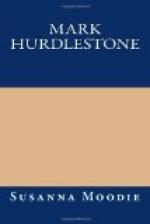“He sent you—he—the hypocrite! Was it not he who robbed me of my father’s love—he, who has robbed me of my natural claims to a portion of my father’s property? What! does the incendiary think that I am blind to his treachery—that I am ignorant of the hand that struck me this blow—that I will stoop to receive as a liberal donation, an act of special favor, a modicum of that which ought to be my own? Mother, I will starve before I can receive one farthing from him!”
“Do not be rash, my son”—
“Mother, I cannot be mean. It grieves me, dearest mother, that you should undertake to be the bearer of this message to me.”
“Are you not both my children?—though, God knows, not equally dear; and ought not the welfare of both to be precious to the heart of a mother? It is not so: Mark never had an equal share of my affections, and God has punished me for my undue partiality, by making him the heir of all.”
“But, mother, this was no fault of mine.”
“True; but he has regarded it as a crime. You have robbed him of my love, and he in revenge has robbed you of your fortune. Had I been a kinder mother to him, he might have prized the gold less, and my affection more. My conscience reproaches me as the author of your present sufferings. Do not make my self-upbraidings more acute, by refusing the assistance which your brother offers you.”
“Esau sold his birthright for a mess of pottage, mother. I will not sell my honor for a sum of money, however acceptable that sum might be. It would never prosper with me, if it came from him.”
“Well, Algernon, if you will not be persuaded, you must have it your own way. Your father, though he received from me a noble fortune, has left me dependent upon your brother. I cannot, if I would, aid you with money; but this case of jewels is valuable; I am old, I have no further occasion for such baubles; I have no daughters to wear them after me. Take them, you can raise upon them several thousand pounds—and may the proceeds arising from their sale be blessed to your use.”
“Dearest mother, I accept your generous present;” and Algernon’s countenance brightened as hope once more dawned in his breast. “If I should be fortunate, I will return to you in hard gold the value of these gems.”
He took the casket from his mother’s hand, and caught her to his heart in a long and last embrace. “Should Heaven bless my honest endeavors to obtain a respectable independence, my heart and my home, beloved one, shall ever be open to you.”
And so they parted—the good mother and the disinherited son, to meet no more on this side the grave.
“Poor mother!” sighed Algernon, as he turned his steps to the widow’s cottage, “how I pity you, having to live upon the charity of that churl! It would seem that my father was determined to punish you for your devoted love to me.”




